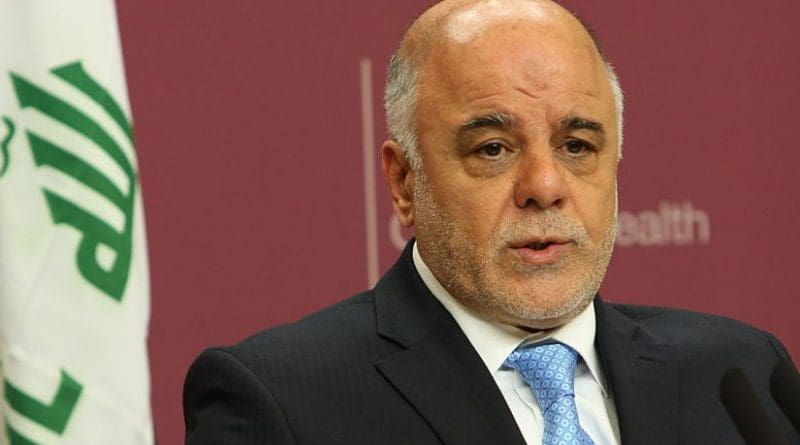Kurds Welcome Offer Of Talks With Baghdad
By Arab News
By Suadad Al-Salhy
The Kurdistan Regional Government (KRG) on Thursday welcomed a call by Iraqi Prime Minister Haider Al-Abadi to talk “under the umbrella of the constitution,” hours after a federal court issued an arrest warrant for the KRG’s vice president, sources on both sides told Arab News.
The KRG’s agreement to start constitution-based talks with Baghdad implies a willingness to cancel the results of last month’s independence referendum.
The KRG said it “welcomed” Al-Abadi’s initiative to start negotiations in order to solve issues “according to the constitution and the principles of partnership and accordance.”
It “stressed its readiness to talk with the central government, and called on the international community to sponsor dialogue between the two sides.”
The statement came hours after a federal court issued an arrest warrant for KRG Vice President Kussrat Rasool in response to his “inciting statements” against federal security forces.
“The court considered the statements of Rasool an insulting and inciting action against the armed forces,” said Abdulsattar Al-Bairqdar, spokesman for the Judiciary Council.
Federal security forces backed by Shiite-dominated paramilitaries on Tuesday pushed to regain control of the last 10 percent of the disputed areas adjacent to Iraqi Kurdistan, said federal security sources.
Baghdad launched a huge military campaign on Monday to “impose the authority of the federal government” over disputed areas in northern Iraq and regain control of the region’s oilfields.
The campaign’s key targets were the northern city of Kirkuk, its lucrative oilfields, Mosul Dam and a direct route to the Habur border crossing with Turkey, said senior federal security officials.
“All that we’re looking for is imposing federal authority in all the disputed areas, reaching the Kurdish border and recapturing the border crossings,” a senior federal security officer involved in the operations told Arab News. “We’ll stop when we achieve our planned goals.”
The military operation was the latest in a series of punitive measures undertaken by Baghdad, which banned international flights to and from Iraqi Kurdistan, stopped financial transactions with the region, rehabilitated the oil pipeline network linking Kirkuk to Ceyhan in Turkey in order to bypass Kurdistan and resume oil exports, and filed a formal request to Turkey and Iran to shut down their border crossings with the region.
Iran shut down its three official crossings with Kurdistan on Sunday. Meanwhile, Iraq and Turkey have begun work to open a new port called Avacoy, 7 km west of Habur, which will bypass Kurdistan, security sources said.
The location is on the edge of the Kurdistan border. In order to reach it, roads have to be extended through the Yazidi-dominated area of Sinjar near the Iraqi-Turkish border, and the Sunni Arab-dominated area of Rabiea near the Iraqi-Syrian border.
Both areas are disputed between Baghdad and Irbil. They were seized by Daesh in August 2014, then by the KRG in 2015 after they were liberated by Iraqi security forces, including Kurdish Peshmerga fighters.
The new crossing will tighten the grip on Kurdistan and strengthen Baghdad’s control of the Iraqi-Turkish border. Ankara on Monday said it had started procedures to hand control of Habur to Baghdad.
Two federal officials involved in the plan said the project will need at least two months to be realized.
“The major step was gaining control of Sinjar, Rabiea and nearby areas on the Nineveh Plain. Our troops have retaken most of these areas in the last few days, and the remainder will be easy,” a senior federal security official told Arab News.
“What we need now is to start the second part of the plan, which includes constructing the required facilities and paving the road connecting the new crossing to the main Sinjar-Rabiea road.”
Kurds in Syria and Iraq have expressed concern about the enthusiasm of Baghdad and Ankara for this project.
“If the Turks deployed their forces along the border on the pretext of securing it, communications between Iraqi Kurds and Syrian Kurds would be completely cut,” a federal Kurdish lawmaker told Arab News.

